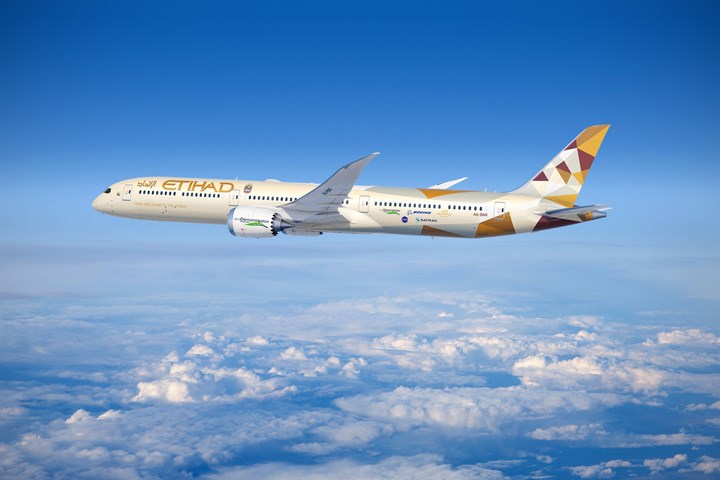Boeing, Etihad sustainability alliance test ecoDemonstrator 787
The ecoDemonstrator program uses commercial aircraft to test technologies that can make aviation safer and more sustainable now and into the future. Use of a 787-10 Dreamliner will evaluate ways to reduce emissions and noise while flying on sustainable fuel.

Photo Credit: Boeing
Boeing (Chicago, Ill., U.S.) and Etihad Airways (Abu Dhabi, United Arab Emirates) reported in July 2020 that it would use a 787-10 Dreamliner to test ways to reduce emissions and noise as part of the aerospace company's ecoDemonstrator program before the airline accepted delivery of the airplane this past fall. The collaboration, which includes extensive sound measurement testing with industry partners, builds on a strategic sustainability alliance Boeing and Etihad formed in November 2019.
"This is the latest program under Etihad's strategic partnership with Boeing, focusing on innovating real-world solutions to the key sustainability challenges facing the aviation industry," Etihad Aviation Group Chief Executive Officer Tony Douglas says. "The ecoDemonstrator program is founded on innovation and sustainability — and these are core values for Etihad Airways, Abu Dhabi and the United Arab Emirates. Etihad and Boeing see a great opportunity to collaborate and share knowledge to minimize the impact of aviation on the environment."
The ecoDemonstrator program uses commercial aircraft to test technologies that can make aviation safer and more sustainable now and into the future. The 2020 program, which began testing in August, is the first to use a Boeing 787-10.
"Industry collaboration is a key aspect of Boeing's ecoDemonstrator program that enables us to accelerate innovation," says Stan Deal, Boeing Commercial Airplanes president and CEO. "We're proud to broaden our sustainability partnership with Etihad Airways by testing promising technologies that can reduce emissions, help commercial aviation meet our climate goals and allow the industry to grow in a responsible manner that respects our planet and its natural resources."
Boeing and Etihad will work with industry-leading partners, including NASA and Safran Landing Systems (Vélizy-Villacoublay, France), to conduct aircraft noise measurements from sensors on the airplane and the ground. The data will be used to validate aircraft noise prediction processes and the sound reduction potential of aircraft designs, including landing gear, that are modified for quieter operations.
In addition, a flight will be conducted during which pilots, air traffic controllers and an airline's operations center will simultaneously share digital information to optimize routing efficiency and enhance safety by reducing workload and radio frequency congestion.
Test flights will be flown on a blend of sustainable fuel, which significantly lowers aviation's environmental footprint. The testing program is expected to last about four weeks before Etihad enters its Boeing 787-10 into service.
Related Content
-
Jeep all-composite roof receivers achieve steel performance at low mass
Ultrashort carbon fiber/PPA replaces steel on rooftop brackets to hold Jeep soft tops, hardtops.
-
Carbon fiber, bionic design achieve peak performance in race-ready production vehicle
Porsche worked with Action Composites to design and manufacture an innovative carbon fiber safety cage option to lightweight one of its series race vehicles, built in a one-shot compression molding process.
-
Nine factors to consider when designing composites cure tooling
Gary Bond discusses the common pitfalls and compromises when designing good cure tooling and their holistic significance for a robust composite production process.















